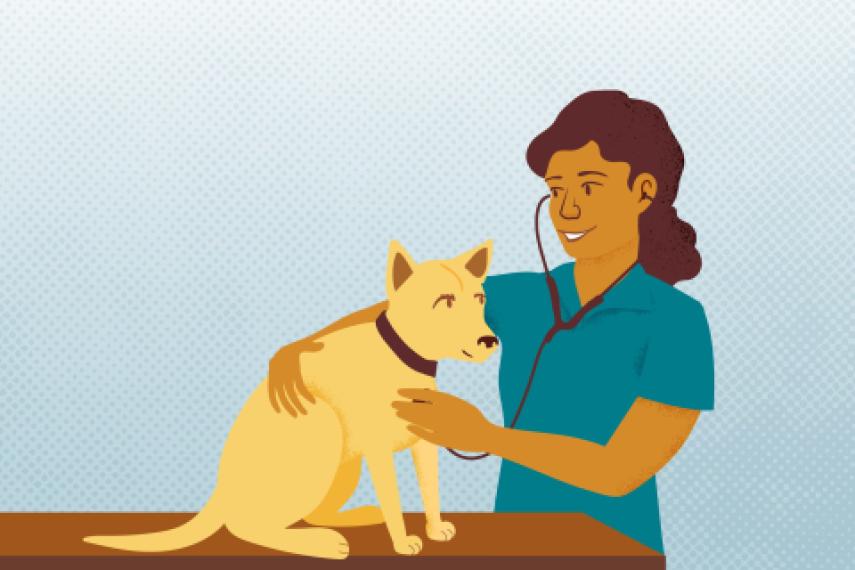
Owning a pet is a joyful and rewarding experience, but it also comes with important responsibilities — including medical care, preventive services and unexpected emergencies. That’s why pet owners might consider pet insurance as a way to manage the cost of keeping their furry companions healthy and safe. Whether you're new to pet ownership or thinking about insuring an existing pet, understanding how pet insurance works can help you make confident, informed decisions.
What Is Pet Insurance?
When people hear the term “pet insurance,” they often think it’s just one type of policy. In reality, there are different kinds of coverage, and you may need more than one type to fully protect your pet and yourself.
There are two main types of pet insurance:
- Pet health insurance: This covers your animal’s medical needs and wellness care. Plans vary widely in terms of cost, coverage and reimbursement, so it’s worth taking the time to compare options before enrolling.
- Pet liability insurance: Typically included in homeowners or renters insurance policies, this protects you if your pet causes injury or property damage. Some insurers may require a separate rider if you own specific breeds or uncommon animals.
If you own particularly valuable animals — such as show dogs, horses or specially trained service animals — your insurance company may offer different options. Be sure to notify your carrier so you’re properly protected.
How Does Pet Insurance Work?
Pet health insurance generally works on a reimbursement model: you pay the veterinary bill upfront, submit a claim and receive payment based on the policy terms. Coverage types include:
- Basic coverage: Limited protection with reimbursement caps per incident and per year.
- Comprehensive coverage: Broader coverage with higher caps and possible discounts on services like vaccinations and lab work.
- Premium coverage: Includes preventive care, wellness visits and ongoing treatments with lower deductibles and broader protection — more similar to human health insurance.
Some pet owners also consider veterinary discount plans, which offer reduced pricing on select services. These are not insurance but may help with routine care expenses in certain situations.
Pet liability insurance, by contrast, is usually folded into your home or renters insurance policy. It covers things like bites, scratches or property damage but does not help with medical care for your own pet. Both types of protection serve different purposes and are often complementary.
Should You Get Pet Insurance?
If you own a pet or are thinking about bringing one into your home, pet insurance can be a wise investment. It helps reduce the financial strain of accidents, illnesses or emergency care — and can make it easier to say “yes” to treatment when your pet needs it.
That said, pet insurance isn’t the right choice for everyone. It’s important to consider your situation and weigh the pros and cons:
Reasons to Get Pet Insurance:
- Financial protection: Unexpected vet bills can add up quickly, especially for surgeries, chronic conditions or emergency visits.
- Peace of mind: Having insurance means you won’t have to hesitate when it comes to making healthcare decisions for your pet.
- Early savings: Insuring young, healthy pets tends to be more affordable than waiting until they develop medical conditions.
Reasons Not to Get Pet Insurance:
- Monthly cost: Premiums can add up, especially for multiple pets or higher-tier plans. You may find you're not getting enough value for the expense.
- Willingness to pay out of pocket: You may be able to afford pet care out of pocket or set aside a small emergency fund rather than pay for insurance.
- Low risk pets: Owners of young, indoor or generally healthy pets may decide to wait or forgo insurance altogether, especially if their pet has minimal exposure to hazards.
It’s also worth noting that some breeds are more expensive to insure or may even be excluded from coverage due to risk factors related to behavior or health. These may include pit bulls, Rottweilers, Doberman pinschers and wolf hybrids, among others.
Where Do I Begin?
Your veterinarian is a great starting point when exploring pet health insurance. They often have insight into which providers work well with their clinic and can offer recommendations based on other clients’ experiences.
For pet liability insurance, check with your homeowners or renters insurance provider. They’ll help you understand what’s covered under your current policy and whether you need additional protection based on your pet’s breed or species.
Takeaway
Pets bring love, laughter and companionship to our lives. As a pet owner, it’s important to plan for both the expected and the unexpected. Pet insurance is one way to protect your pet’s well-being and your financial peace of mind.
Here’s what to remember:
- Many pet owners will benefit from having insurance — especially for medical emergencies.
- Pet insurance comes in two main forms: health insurance and liability coverage.
- Depending on your financial situation, risk level and pet’s health, insurance may not be the right choice for everyone.
The best decision is the one that fits your budget, your pet’s needs and your long-term plans. Whether you insure your pet or set aside money in case of emergency, preparing in advance helps ensure you can give your pet the care they need — no matter what life brings.
